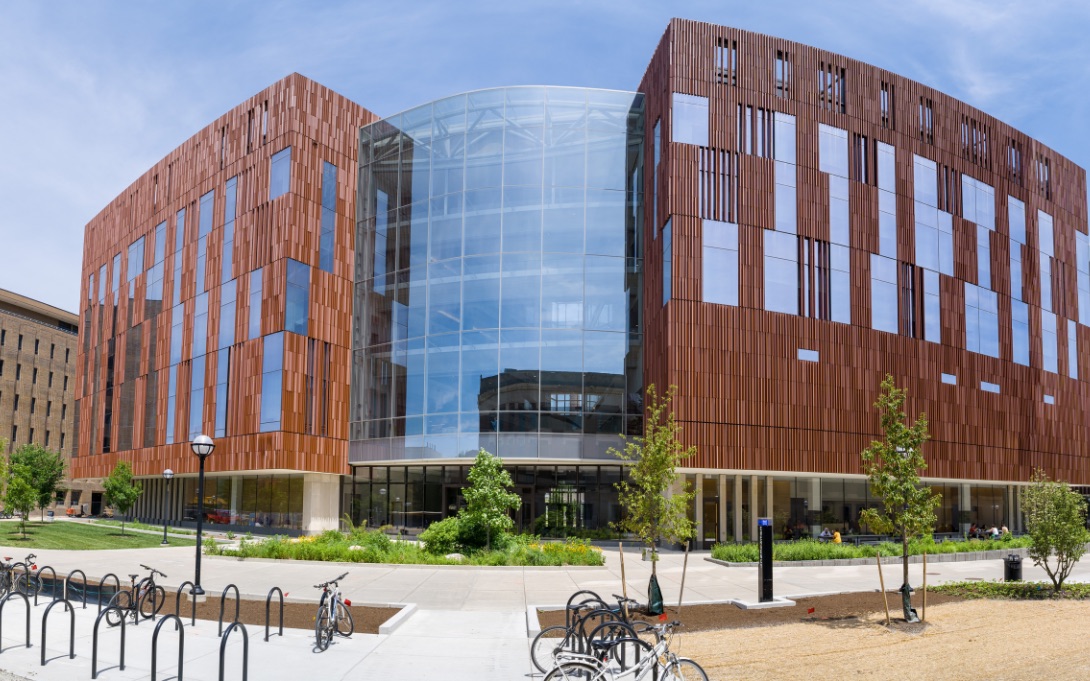
Have you ever disassembled a broken coffee maker or a sink, convinced you could fix it, only to end up with a jumble of parts? As a child, Terry Nguyen’s (BA ’25) curiosity about how things worked led to a broken fan, a pile of parts, and no idea how to put it back together. But it sparked a revelation.

Innovation, he discovered, is not just about bright ideas; it’s about understanding the systems that make them work. His fascination with invention led him to patent law where he learned about safeguarding ideas to improve future scientific advancements.
“As emerging technologies like AI and biotechnology push the boundaries of existing patent frameworks, I’m drawn to the challenge of shaping policies that balance innovation with ethical and legal considerations,” says Nguyen, a research assistant for the Ford School’s Science, Technology and Public Policy program (STPP). “Learning about science and technology policy has reinforced my desire to help inventors navigate the complexities of patent law, ensuring their ideas are not only recognized but also safeguarded for real-world impact.” After graduation, Nguyen plans to pursue a law degree.
Nguyen’s journey is part of a growing trend. Students around the country are increasingly interested in the relationships between science, technology, and society, and STEM-in-Society programs are expanding to meet their enthusiasm. Across the U.S. there are nearly 250 multidisciplinary training programs that prepare professionals to conduct socially responsible research and develop better science and technology policy for the public interest.
“Students are clamoring to better understand the social, ethical, and policy dimensions of emerging science and technology and steer innovation towards the public good,” says STPP Director Shobita Parthasarathy. “Our goal is to help them do just that.”

Despite their importance, STEM-in-Society programs remain underfunded and are often overlooked by university administrators and science funders. A recent STPP report, Broadening Horizons: How STEM-in-Society Programs Train Socially Responsible Scientists, Engineers, and Policy Leaders, assesses this landscape and offers recommendations for its development and growth.
“STEM-in-Society programs prepare students from a wide range of disciplines to understand how values and society shape, and are shaped by, science and technology and to advocate for better science and technology policies,” Parthasarathy says. “Some use this knowledge to pursue careers in science and technology policy; some become responsible scientists and innovators; and others become scholars who study science and technology in society.”
Trevor Odelberg (PhD ’24), who complemented his electrical and computer engineering studies with an STPP graduate certificate, says the need for policy literacy in STEM education has never been greater: “Both engineers and policymakers are trained to turn abstract ideas into effective solutions given real-world constraints. Everything from how science is funded, translated from the lab, and interacts with the world is affected by policy.”
Odelberg now serves as an AAAS/IEEE U.S. Congressional Fellow in the office of Senator John Hickenlooper (D-CO). He notes, “STPP’s program focus on policy process, memo writing, and analysis has helped me contribute to legislation on clean energy, AI, and technology supply chains. Understanding policy fundamentals has helped me communicate with other policymakers while letting my technical expertise stand out.”
STPP graduate students pursue careers across sectors including government, think tanks, nonprofits, industry, and academia. For undergraduates, STPP currently offers research opportunities to students like Nguyen to dive deeper into ethical and social issues related to science and technology.
In recent years, STPP has expanded its offerings with undergraduate opportunities and an online course available to learners around the world. Looking ahead, STPP is developing a master’s concentration, legislative fellowships, and post-doctoral and midcareer professional training.
“Since 2006, STPP has educated hundreds of students seeking to understand the relationships between science, technology, and society and shape both innovation and public policy,” Parthasarathy says. “But as science and technology become central to our daily lives, a wide array of budding policymakers, scientists, and engineers need this kind of training, and we are eager to provide it.”
By Rebecca Cohen (MPP ’09)
More in State & Hill
Below, find the full, formatted spring 2025 edition of State & Hill. Click here to return to the spring 2025 S&H homepage.
